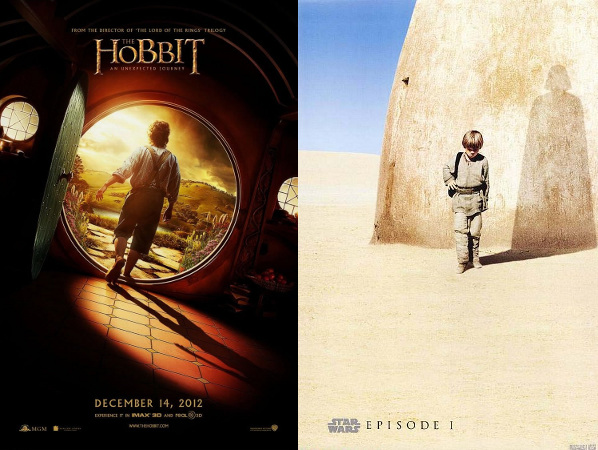
As the release date approaches for the first movie in The Hobbit triogy, I find myself comparing the circumstances to the Star Wars prequels. Why? In both cases you have…
- A visionary director returning to…
- A high-profile trilogy set in a fantastical world…
- After years away…
- To tell a prequel set a generation earlier…
- Including significant events that set up the other story (Vader’s turn to the dark side and the rise of the Empire, Bilbo finding the One Ring and the Necromancer of Mirkwood).
- Some cast are returning as younger versions of the same characters (Palpatine, C-3PO, Gandalf, Elrond)
- Other characters have been recast (Obi-Wan, Bilbo).
But of course, Star Wars isn’t Lord of the Rings, and Peter Jackson isn’t George Lucas. Let’s look at four big differences.
1. Time
The Phantom Menace came out 22 years after Star Wars: A New Hope and 14 years after Return of the Jedi. An entire generation of children grew up with the original trilogy and were adults by the time the prequels started. And with 14 years of no Star Wars films, the prequels had to justify the wait.
With Lord of the Rings, it’s only been 10 years since Fellowship of the Ring, and 8 since Return of the King. We’ve spent half the time away from Middle Earth as we did from that galaxy far, far away. Children have become teenagers, and teenagers have become adults, but there isn’t quite the same level of “My childhood is back!” nostalgia that could make or break the films for a large section of the audience.
2. Directorial Experience
According to IMDB, George Lucas stopped directing after the first Star Wars film in 1977. He kept writing and producing, of course, but he hadn’t directed a film in two decades when he picked up The Phantom Menace
Peter Jackson may have slowed down a bit, but between wrapping up the extended edition of Return of the King in 2004 and picking up The Hobbit in 2010, he’s directed King Kong and The Lovely Bones.
3. Source Material
This is a big one. The Star Wars saga was an original story by George Lucas. When he wrote Episodes I-III, he was free to do anything he wanted as long as it didn’t contradict Episodes IV-VI. The Hobbit films are based on Tolkien’s novel, the appendices from Lord of the Rings, and his published notes. The core of the story is a lot more well-established.
4. Executive Meddling Potential
Zillionaire George Lucas wrote, directed and produced the Star Wars prequels, financing them himself. Nobody was in a position to tell him no. On one hand, this is good, because there weren’t any suits with more money than talent to tell him to add an extra car chase here, or add a love triangle there, and does Revenge of the Sith *really* need to be PG-13, can’t we dial down the violence a bit? On the other hand, it also meant no one could say, “George, don’t you think Jar-Jar is a little over the top?” or “This fireplace scene just isn’t working.”
Peter Jackson lucked out with the Lord of the Rings trilogy in being able to mostly do his own thing. But the legal battles and rights-wrangling that have caused The Hobbit to take so long to reach the screen indicate that the studios might be trying to exert their influence to “protect” their investment (which usually seems to involve killing the goose that lays the golden eggs). Certainly the decision to stretch the story out to three movies sounds like the studio trying to multiply their ticket sales, though I can also see Jackson and Weta deciding that this is their last chance to explore Middle Earth, so they might as well make the most of it.
Well, it’s just one week until The Hobbit: An Unexpected Journey opens and we all get to see how it turned out. One thing that’s definitely changed for me: Unlike Episode I, there’s not a chance that I’ll be standing in line for hours to see a midnight (or 2AM) showing. I can wait until Saturday afternoon.